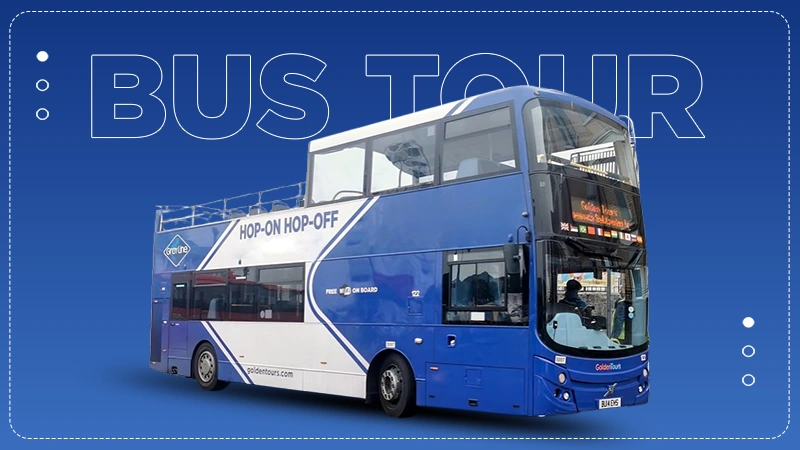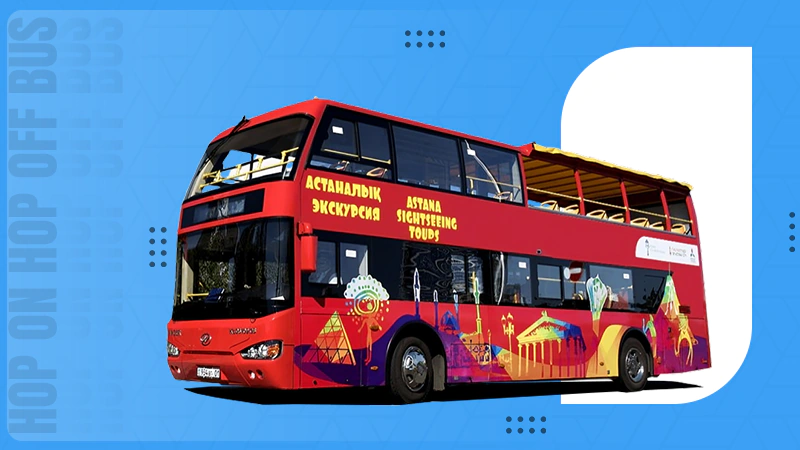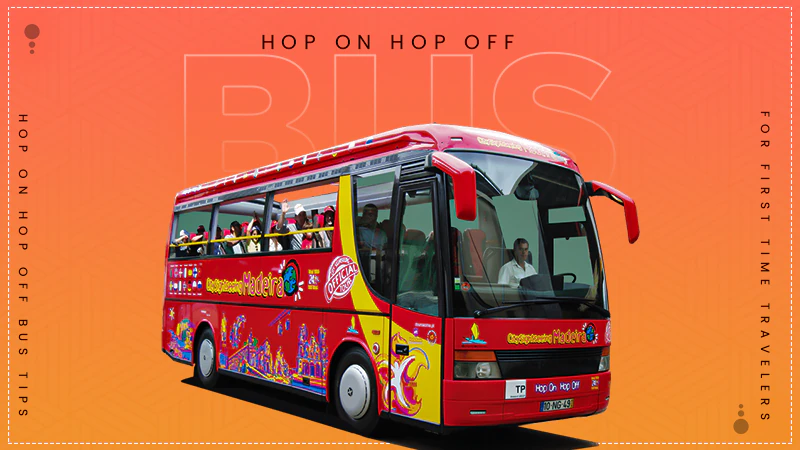
“Every travel story is unique, and the most exciting ones are on the road.”
Introduction
Traveling by road is fun as long as there are no accidents. Well, it’s the harsh truth for wanderers, and a practical idea to have a backup plan for your safety. Whether your traveling style is an open-roof car or a van life, car insurance is a must to add to your itinerary.
Road trips make for exciting and cost-effective travel allowing flexibility in discovering beautiful destinations. However, during an emergency, a coverage plan saves travelers from vehicle maintenance expenses, personal injury protection, and other legal liabilities.
When traveling, you also need to know about preventive measures like staying alert during bad weather conditions, advanced route planning, and setting a travel budget. So, here’s a comprehensive guide to navigate smoothly the twists and turns of a safe road trip.
Why Car Insurance Matters for Travelers
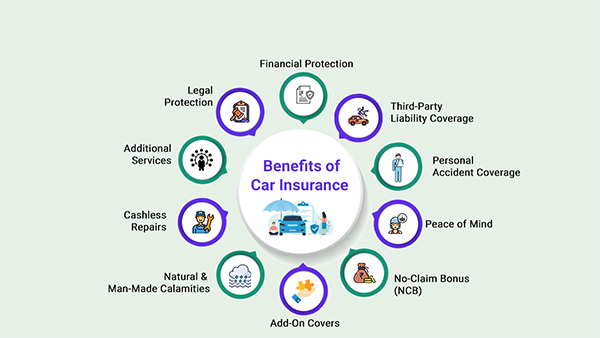
To start with, car insurance is different from travel insurance. Travel insurance covers a wider range of commutes, including traveling by plane, bus, auto, ship, etc. Car or auto insurance is designed keeping in mind the vehicle maintenance and the well-being of the car owner.
Car insurance can be beneficial for three main reasons:
- Financial Protection – It covers all the maintenance, repairs, and upgrades of a vehicle. It also includes medical expenses coverage to help the owners during the legal process in case of an accident.
- Third-Party Liability Coverage – In case the car is damaged during an accident with a third party, auto insurance covers the costs, saving you from legal consequences.
- Peace of Mind – With auto insurance, you can safely enjoy your road trip to any city or state. Moreover, if there is a theft vandalism, or a replacement of an auto part, it is also covered in the insurance.
FAST FACT
Minivans are the least expensive vehicle type to insure, with an average annual rate of $2,041.
Types of Car Insurance Coverage
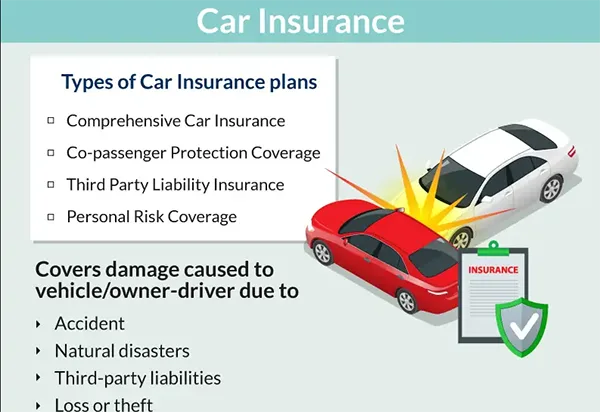
It’s important to know about the different types of car insurance to determine if it is suitable to your car model, the age of the vehicle, location, and the capacity of the engine. Moreover, if your road trip involves cross-country trips with difficult paths then it is relevant to first look at the following types of car insurance for maximum coverage.
Liability Coverage
Though insurance details may somewhat differ for every country or state, liability coverage is necessary if in a case you are involved in an accident. There are essentially two types of Liability Coverage – bodily injury and property damage.
In bodily injury liability, the physical harm to a person caused by a car accident is included such as medical expenses, lost wages, and legal fees. When there is any damage to the property of the car owner involved in an accident, the property damage liability covers the costs.
Collision Coverage
When two vehicles collide due to unforeseen reasons, such as hitting an electricity pole, it comes under the collision coverage. The consideration of who is at fault doesn’t matter in this case. It differs from liability insurance as it only covers the car repairs.
DO YOU KNOW?
Collision Coverage is not mandatory, but in case you have an auto loan or a lease.
Comprehensive Coverage
Almost similar to collision insurance, comprehensive coverage assists vehicle owners with the costs of injury other than through the collision. It includes things like theft, vandalism, natural disasters, fire, and animal damage.
Experts suggest, getting comprehensive insurance is a better option if you have a new car. Whereas, for vehicles older than 5 years, zero depreciation insurance is a great idea.
Personal Injury Protection (PIP)
The most important factor that travelers consider when going on a road trip is Personal Injury Protection or PIP. It covers the medical expenses of all passengers of the vehicle regardless of who was at fault in an accident. It includes lost wages, rehabilitation, and funeral expenses.
If you have premium auto insurance with a PIP, you need to check if it is mandatory in your state, the driving record, age, gender, marital status, and the place where you live.
Uninsured/Underinsured Motorist
When you are involved in an accident with a person who doesn’t have insurance and the expenses need to be covered, then the Uninsured Coverage kicks in.
However, if the other party or person in the same accident does not have enough or has a lesser value of insurance then the Underinsured Motorist insurance helps settle the expenses.
Road Trip Safety Tips
Now that you have understood the benefits of car insurance, you are ready to take your dream road trip. Traveling with family or friends, it is imperative to take heed of the road trip safety tips as mentioned below:
Inspect Car Thoroughly
Before embarking on your journey, inspecting your car’s basic mechanics is of utmost importance. Make sure that the tires, lights, fluids, brakes, windshield, engine, and battery are in top working condition. The inside of the car also needs to be properly ventilated and therefore check the air filter and air conditioning systems before moving out.
TOP TIP
Don’t forget to fill the petrol tank, but also store extra fuel while marking the spots in the route map for gas filling stations.
Pack an Emergency Kit
While accidents can happen at any time, even minor cuts may ruin your road trip. Keeping an emergency kit is a must when traveling on the road because finding a medical or convenience store at all times may or may not be possible.
Plan Route in Advance
Always plan your route well in advance according to the weather as well as the season. Cold season will require keeping extra warm covers to keep you warm. In summer, road trips are much more popular but at the same time staying hydrated will keep your skin and body healthy.
Stay Alert When Driving
You will be spending a lot of time on the road. And while trips are about traveling from one destination to another, it can be tiring to drive all the way. To avoid any accidents, always staying alert when driving should take precedence.
You can listen to your favorite song or play word games with your friends to keep yourself awake. If you are traveling with a large group or family, then taking turns to drive is a good idea to thwart any damage or disaster.
Obey Traffic Rules
The adrenaline rush may tempt you to open the windows of your car and speed through the empty road. However, it is during these times that collisions may happen due to a wild animal suddenly appearing in front of the car or making a steep turn over the hills during the rainy season.
Obeying traffic rules even on a small road or a highway is a good habit. It is especially helpful if you are in a different state that may or may not have strict speeding traffic rules.
Monitor Weather Reports
The weather plays a significant role when planning a road trip. The rainy season is not considered favorable because there are more chances of tires skidding or slipping through the streets.
Therefore, it is recommended to Check forecasts across trip spans to steer clear of storm risks. Stop your car in a safe place and wait for the storms to become mild before starting traveling again.
Consider Roadside Assistance
Another relevant road trip safety tip is to get an RSA or Roadside Assistance coverage for vehicle breakdowns or any other mechanical failure. Some well-known car insurance companies offer 24/7 services with quick customer support and a mechanic who reaches the spot and tries to fix the vehicle issue. If there is a serious problem with the car, then arrangements are made to tow it to the nearest garage.
Secure Overnight Stays
On a long road trip, the only way to survive is not to sleep in the car but actually to consider staying in a safe overnight stay. Always check the reviews of roadside motels and book in advance to save on extra expenses.
Road Trip Planning Tips
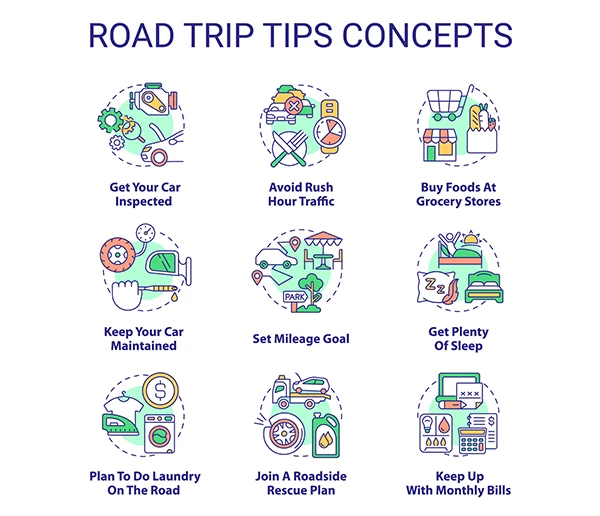
Sometimes planning a road trip is much more difficult than traveling by flight or by train. It’s because you have complete freedom to modify your plans or even stop in between a route to enjoy a scenic view.
While it is great to travel at your own pace independently, it also adds responsibility to take care of the following tips to save time and money.
Set Realistic Budgets
Your tour budget depends on the number of people traveling with you, the length and distance of the trip, and necessary and extra expenses. If you plan to shop or are going for a special musical event, add that too in the budget. Spending on food and drinks is natural, but overeating should be avoided to stay healthy on the road.
Book Suitable Stays
Every location has its own unique charm, highlighted by the type of accommodation available there. Book your stay according to the number of travelers and if you are part of a large group, chances are the hotel will accommodate a big room for all, which will prove to be cost-effective.
Small or big hotels are always able to accommodate a room for couples. And for solo travelers and backpackers, pre-booking a single room in a nice hotel could be a good deal.
Match Activities to Interests
Never let an opportunity to get together with friends go to waste, especially the one where all of you are under one car hood. Many interesting online and offline games can be played while traveling, such as card games, Twenty Questions, road trip scavenger hunts, the movie name game, bingo, mad libs, etc.
Travel With Companions
Create happy memories by traveling with your companion. It is the perfect time to bond by spending quality time together. It has its advantages because there is no interruption of a busy work life or other pending tasks. You can improve your relationship by resolving many issues and creating a stronger connection than before.
Pack Sufficient Gear
Packing is an art and for a road trip, you should take the essentials, but also leave room for something special to purchase on the way. Some important gear to pack are:
- A travel pillow
- First-aid kit
- Bluetooth speaker
- Physical map
- A reusable water bottle and snacks
- Packing cubes
- A mini cooler
- Extra luggage for shopping
- Medications
Road Trip Etiquette
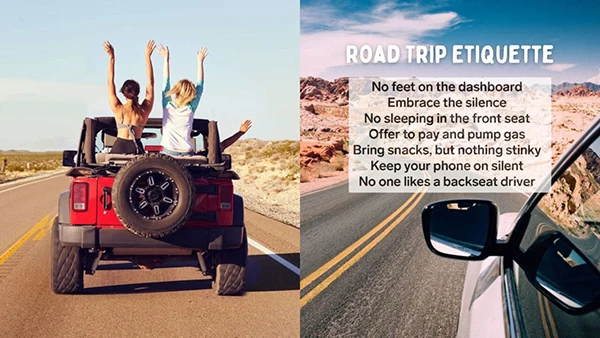
It’s easy to lose interest when you are on the road for a long time. Driving through small or big lanes, one shouldn’t forget that every locality has a different aura and local rules that should be strictly followed. Some common road trip etiquette keeps everyone in a good mood.
For a smooth drive, always maintain your car’s condition through regular checks, follow speeding and traffic limits, take timely bathroom breaks whenever you see a roadside restaurant, and snack healthy.
Exhibit Courteous Driving
Long drives can make some people grumpy and frustrated. It’s best to enjoy a road trip with good music while following courteous driving methods. Things that should be avoided are overspeeding, driving in the wrong lane, honking, cursing, or even playing loud music can only land you in legal trouble.
Leave Spaces Cleaner than Found
Keeping spaces clean while traveling is a good habit and should be followed by everyone. Instead of throwing the trash outside the window, dispose of it properly in the correct bin. Another method is to collect all the empty chip bags and soda cans in a box and throw them later in a garbage can.
FUN FACT
To prevent access accumulation of garbage from tourism, many green locations have a law to carry their own trash bag while visiting or wandering around the place.
Safeguard Local Wildlife
The jungles are home to some interesting animals and birds. As a mindful tourist, take the initiative to safeguard the local creatures by driving slowly around the forest area. This will prevent sudden collisions with wildlife that may be running around.
Value Regional Traditions
When researching and planning your road trip to a new place, respect their regional traditions. Sometimes the locals of an area have strict cultural rules to follow and places that may be out of bounds for outsiders.
Always pay attention to their behavior and customs without being intrusive or overwhelmed. As a tourist, try their cuisines and be adaptable to their environment.
Types of Amazing Road Trips
Whether you have planned a trip with your partner or a group of friends, there’s a lot to explore in different types of road trips. Here are a few you would like to try for your next adventure.
Scenic Drives
The sunrise and the sunsets, the greenery, and the beaches, are the definitions of beautiful scenic drives. Plan a road trip along a stunning coastline or a snowy mountain range, and stop to capture the precious moments in your camera and your heart.
Sightseeing City Tours
For first-time road trippers, a sightseeing city tour is a great idea. Simply, note down all the well-known visiting spots on the map, plan and follow a car route circling the city, and enjoy the drive.
Historic Trails
Take your family and kids to a historic trail by visiting the museums and old architectural places. Book a tour guide and listen to stories of the kings and queens. Getting familiar with the details of past conquests is inspiring and a unique experience.
Adventure Trips
Take your mean machine on an adventurous trip to the snow-clad mountains with all the supplies in your backpack. Or feel the beach air swishing past your long hair as you drive along the sandy beach. Explore trekking and car camping as you hop on from one place to another, keeping all your belongings safely in your vehicle.
Conclusion
A successful road trip requires a lot of preparation, packing, and regular vehicle checks. Half of your supplies will be with you while driving through sometimes narrow lanes and other times on the highway. Also, learn about What to Do If You Crash Your Rented Car on Vacation by reading this article.
Enjoy your journey, securing adequate car insurance sufficient to cover potential risks over far distances from home. It is important for road trip safety as you navigate every turn confidently. This is your chance to experience freedom while also following traffic rules. So, what are you waiting for? Start packing for your next road trip.







